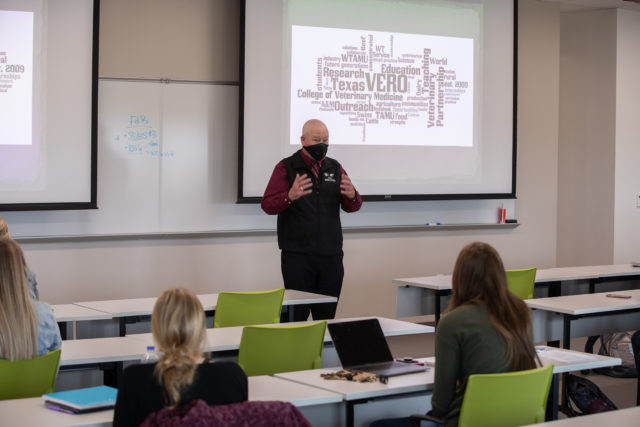Veterinary Medicine in the Texas Panhandle
Veterinary service to rural communities in the Texas Panhandle is typically sustained by veterinary practices that are “mixed” (dogs, cats, horses, cattle, sheep, goats, swine, etc.), rather than those that specialize in only large or small animals. Livestock husbandry and stewardship are provided by these same veterinarians. The region is known for having some of the world’s best livestock veterinarians, nutritionists, and animal scientists serving as technical specialists and consultants. VERO will continue this legacy by focusing on training students to serve rural communities (mixed practices), as well as preparing students to better understand how to provide livestock husbandry and stewardship services.
VERO’s Educational Focus
 Impacting Undergraduates
Impacting Undergraduates
VERO is already expanding the pipeline of students from undergraduate study at West Texas A&M University (WTAMU) to the Texas A&M College of Veterinary Medicine & Biomedical Sciences (VMBS) for their DVM education. This double exposure encourages them to return and practice in rural communities, to support livestock industries, and to catalyze economic growth in the Texas Panhandle region.
Enhancing the DVM Curriculum
The VERO educational program will primarily support the training of the DVM students at the VMBS—it will not have its own student body separate from the VMBS. Although construction of the main facility is not yet complete, the VERO faculty have already begun student training. In fact, the summer of 2019 will be the third that “summer interns” have lived on the WT campus while working with mixed-animal veterinarians and livestock operations (feed yards and dairies).
Additionally, VERO has begun clinical rotations for VMBS students. In May of 2019, VERO completed a week-long program that introduced select VMBS students to the Texas Panhandle’s livestock production and mixed practice possibilities. Starting in the fall of 2019, VERO faculty will begin regular mixed-animal practice training rotations that focus on providing care for dogs, cats, horses, cattle, sheep, goats, and swine. In the future, select VMBS students will also have the opportunity to learn about equine dentistry at VERO.
2+2 DVM Program
The VMBS completed a pivotal step in the development of its 2+2 veterinary program on April 13, 2020, when the college received official program approval from the American Veterinary Medical Association (AVMA) Council on Education (COE).
- The first cohort of up to 18 Texas A&M first-year veterinary students will begin their DVM studies at the VERO facility in fall 2021.
- Those students will spend their first two years in Canyon on WT’s campus, where they will receive essentially the same basic DVM education provided in College Station but with convenient exposure to livestock and rural veterinary medicine.
- Every year after, there will be two cohorts at one time cycling through the Canyon location before their third year at the VMBS in College Station, with the option of returning to Canyon for a portion of their fourth-year clinical rotations.
Established in 2009, VERO is the partnership between the Texas A&M University College of Veterinary Medicine & Biomedical Sciences (VMBS)
and the West Texas A&M University (WT) Paul Engler College of Agriculture & Natural Sciences
to bring Veterinary Education, Research, & Outreach to the Texas Panhandle.

